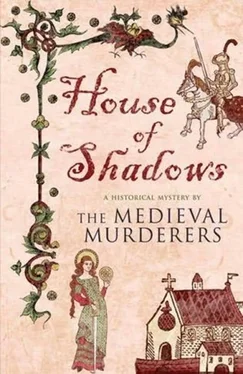Still, the tall, bearded knight with the calm, square face could easily understand how a city like this must be thrilling to a man like his companion, Simon Puttock, from Devon. Just how impressed Simon was would have been perfectly plain to a less observant man than him.
‘Christ’s ballocks, Baldwin! Look at the size of it! I thought Exeter’s bridge was huge, but this !’
Baldwin grinned to himself. His companion was more than a decade younger, and, although they had often worked together in the last eight years, he as keeper of the king’s peace charged with capturing and prosecuting felons, Simon as bailiff to the Abbot of Tavistock with responsibility for law and order on the troublesome tin-mining lands of Dartmoor, Baldwin had never truly accustomed himself to Simon’s parochial view of the world. ‘Yes, I would say it is perhaps the most impressive bridge in all Christendom.’
Which was true. It might not have been as elegant as some, God knew. The bridges of Paris, of Rome and of Avignon were all marvellous to behold – but there was something about the immensity of this, with the gaudy red and white, blue and gilt paintwork on the huge buildings that stood over the roadway like an enormous series of tunnels, that was almost otherworldly. Nineteen arches, some hundred or more shops on it, the chapel, the drawbridge halfway along its length – it was an immense creation.
Men in other cities built from a desire to make their world beautiful; Baldwin believed that Londoners built to be rigorously efficient – and to overwhelm visitors.
They were here, to Baldwin’s disgust, because he had been persuaded by the Bishop of Exeter. It was much against his better judgement, but he had a feeling that many in power were not to be trusted, and if the government were dishonourable, it ill behoved him to complain without attempting to do something about it himself. So here he was, recently elected to the English Parliament, ready to do his duty and uphold the honour and integrity of the nation’s laws so far as he was personally able.
That thought made him curl his lip with self-deprecating amusement. It made him feel ridiculous. He was a rural knight. At home in Devon he understood life. Here he was aware at all times how alien the people seemed…how foreign he felt. And that it was people here, like those in the Parliament, who had eagerly helped destroy his order.
The Bishop of Exeter had a house just by the Temple, he knew, west of the city walls, just by the Fleet river. Truth be told, Baldwin could have brought Simon by that route, but he hadn’t. He needed to prepare himself before he took another look at the Temple grounds. Instead he had chosen to come here, south of the river, and to cross the Thames over the drawbridge at London’s great bridge. Once here, he could turn west more easily, he thought.
But when they had passed over the river and entered the city walls, Baldwin gazed that way with a heavy heart. If he must go there and see his old order’s headquarters buildings, he would do so after resting. To go there now, tired and depressed, would serve no useful purpose to anyone.
‘Follow me. I know a place to stay,’ he said, and led the way into the great city, taking Simon eastwards, away from the bishop’s London house – the enormous place just outside the Temple’s grounds.
William de Monte Acuto stood pensively in his hall, a middle-height man clad in a rich scarlet tunic with fur trimming his collar. Few even in London had known wealth such as he had enjoyed – once, but no longer.
Only a short time ago he had been a strong, healthy, fair-haired man with chiselled features that were his own secret pride. His chin was powerful and square, his nose straight, his brow unmarked by scars even after a number of battles at sea, and he knew that women looked at him with lust in their eyes.
But no longer. Where once his calm blue eyes had exuded confidence, now there was a drawn introspection. Laughter lines were replaced by tormented tracks at either side of his mouth: the marks of anxiety and loss. Few had known such wealth, no – and fewer had seen it disappear so speedily.
‘Continue,’ he said.
This growing rage was hardly new to him. Since his fall from favour, the anger had never been far from him. Still, that someone could have betrayed him was unthinkable – it was almost a prerequisite in business , aye, but this was one of his own . Any man who had spent a little time on board ship to make money knew that many merchants were in truth little better than pirates. Nothing was ever intended as a personal insult, of course, but if a man could steal another’s cargo at sea, far away from prying eyes, then he would be an arrant fool not to do so. It was natural.
But this… this was different. This was a man he had brought up, a man he would have trusted to the ends of the earth, just as any lord would trust his most devoted men-at-arms. This was intolerable !
‘Master, I am truly sorry…’
‘I said: “continue”,’ William stated softly. He didn’t need to look at the messenger to know how his cold tone would have affected the man. Any man who had served him as long as old Perce would know that his voice was more often an indicator of his mood than were his eyes.
‘As you ordered, I followed him. He went up towards the water, as you reckoned, near the Bishop of Winchester’s house.’
Once William had owned properties in London itself. That was back in the past, when he had been rich. Not now, though. Now all he had was this small manor in Surrey, a short way south of Southwark.
‘So he went to the whores?’ William hoped so. Perhaps this was all: the lad was wandering up to the bishop’s lands. The wenches were so common up there, they were known as ‘Winchester geese’. The bishop waxed fat on their rents, and what could be more natural than that a lad of his age, almost twenty, should want to go and slake his natural desires?
‘He didn’t stop there. He carried on, master.’
William closed his eyes. ‘And?’
‘Master, I am sorry. I can tell you only what happened.’
‘Then do so!’
‘I saw him. He went up past St Thomas’s and over to Bermondsey. There was a woman there. It was Juliet Capun.’
‘So I was right. He is betraying me,’ William said heavily. He turned and walked slowly to his table, sitting on his great chair, trying to hold back the tears. Looking up, he nodded. ‘You’ve done well, Perce. Very well.’
He barely heard the man’s sad apologies, and Perce’s departure went unnoticed. At least Perce was still loyal to him. It was treachery that offended him more than anything.
Especially the treachery of his own son.
It was naughty to tease the novices, but it was also a time-honoured tradition, and when his novice asked about the ghost, Brother Lawrence was not the man to let an opportunity pass him by. There were brief periods during which he was permitted to instruct John, and he did have a duty to let the boy know about the appalling history of the priory.
Only later would he realize what had been happening as he slowly paced about the cloister, but at the time all he thought about was the expression of rapt horror on John’s face as he told the story of the ghosts of the priory.
‘Her name was Lady Alice,’ he said with relish. The basics he knew, of course, but any story had to be embellished to make it believable, and twenty years here in the convent had lent his imagination wings. ‘She was brought here for safekeeping, and her lover was a chaplain, a strong, bold fellow called…Francis. He was here to watch over her, but she had a lustful spirit that could not be tamed. She was tempted, and she succumbed and tormented poor Francis until he also yielded.
Читать дальше












